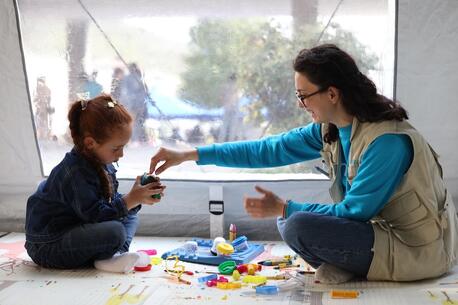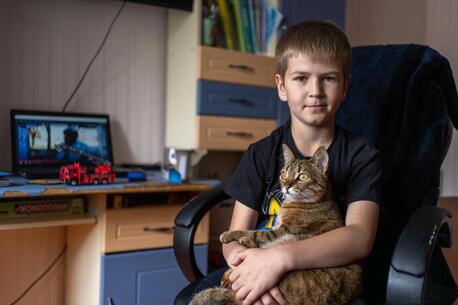
How Are You, Really?
I’m Kyle, an intern on UNICEF USA's Community Engagement team, former UNICEF USA National Youth Council member and current sophomore at Yale, where I study Neuroscience. I’m passionate about encouraging real talk about mental health to hopefully spark real change. I hope that seeing a young person speaking openly about mental health will inspire other young people to do so.
The question "How are you?" has always confused me. It gets asked at the beginning of almost every conversation, no matter if it's with a significant other or a best friend or someone who was in your middle school science class, but hardly ever is it really asked.
To me, the world is weird and hectic and uncomfortable and sometimes lonely and overwhelming, and "how are you doing?" in the middle of all that doesn't seem trivial. It seems really important
For the most part, "how are you?" is asked out of social reflex, so much so that it's often greeted with an equally reflexive "fine" or "good." I've never understood why this question is asked and answered so automatically-as if it's trivial. To me, the world is weird and hectic and uncomfortable and sometimes lonely and overwhelming, and "how you are doing?" in the middle of all that doesn't seem trivial. It seems really important.
So, since I was in high school, I’ve stopped glossing over the question and instead answered it honestly. I would say so if I was doing well; if something were wrong, I would say so too.
I quickly found that nearly every time I replied truthfully, after a moment's hesitation, the following words out of my friend's mouth were "Why?" A sincere "Why?" An invitation to talk about what was on my mind, to get something off my chest and process it with someone I trusted.
It's the second response that tends to get a reaction. The first time my friends hear this sincere response from me, they all get that wait-a-minute-is-he-going-to-talk-about-emotions look in their eyes. It was intimidating the first few times to break social convention and respond with something other than "Good, how about you?" I didn't know how my friends would respond, most of whom were between the ages of 15 and 17.
But I quickly found that nearly every time I replied truthfully, after a moment's hesitation, the following words out of my friend's mouth were "Why?" A sincere "Why?" An invitation to talk about what was on my mind, to get something off my chest and process it with someone I trusted.
Soon, the answer to the question, how are you? was the bulk of most of my conversations, and I began to feel closer to my friends than I had ever before.
More than that, though, when I began responding truthfully, my friends began to do the same. They stopped responding with just “fine” or “good.” If something was on their mind, they would be comfortable enough to share it with me. Talk about feeling lonely, stressed, sad, or conflicted if needed. Their stories were often sprinkled with phrases like “I’ve never really talked about this before” or “You’re the first person to hear this,” but it was something that needed to be heard.
Soon, the answer to the question, how are you? was the bulk of most of my conversations, and I began to feel closer to my friends than I had ever before. Respecting that three-word sentence helped show the people closest to me how much I care and show me how much they care in turn. It signaled to my friends and peers that there's no shame or judgment in speaking about one's feelings and that it's okay not to be okay.

My most recent Real Talk TikTok - "How are you, really?" - Check it out @UNICEFclubs
I still get a little uncomfortable when I first answer honestly with someone I don’t know well, still a little afraid to go against the social norm. That said, I am constantly amazed at how others follow suit and open up too. Sharing a part of myself with others through that question not only has lifted weights off my shoulder during tough days but has helped others to share the troubles they have been keeping inside. So maybe, next time someone asks, “how are you?” you might consider being vulnerable and sharing more about how you are than just “fine” or “good.” This action doesn’t only need to be on the level of the individual either; clubs can help encourage more open communication, too!
*We know mental health can be a difficult topic for some people. As an organization we do not provide mental health direct services. Our top priority is your safety. Those that are at risk should seek immediate assistance from emergency personnel or call 911. To learn more about mental health and how to get help, please review the information provided by the CDC at cdc.com/mentalhealth
*We know mental health can be a difficult topic for some people. As an organization we do not provide mental health direct services. Our top priority is your safety. Those that are at risk should seek immediate assistance from emergency personnel or call 911. To learn more about mental health and how to get help, please review the information provided by the CDC at cdc.com/mentalhealth
*We know mental health can be a difficult topic for some people. As an organization we do not provide mental health direct services. Our top priority is your safety. Those that are at risk should seek immediate assistance from emergency personnel or call 911. To learn more about mental health and how to get help, please review the information provided by the CDC at cdc.com/mentalhealth
*We know mental health can be a difficult topic for some people. As an organization we do not provide mental health direct services. Our top priority is your safety. Those that are at risk should seek immediate assistance from emergency personnel or call 911. To learn more about mental health and how to get help, please review the information provided by the CDC at cdc.com/mentalhealth
HOW TO HELP
There are many ways to make a difference
War, famine, poverty, natural disasters — threats to the world's children keep coming. But UNICEF won't stop working to keep children healthy and safe.
UNICEF works in over 190 countries and territories — more places than any other children's organization. UNICEF has the world's largest humanitarian warehouse and, when disaster strikes, can get supplies almost anywhere within 72 hours. Constantly innovating, always advocating for a better world for children, UNICEF works to ensure that every child can grow up healthy, educated, protected and respected.
Would you like to help give all children the opportunity to reach their full potential? There are many ways to get involved.





